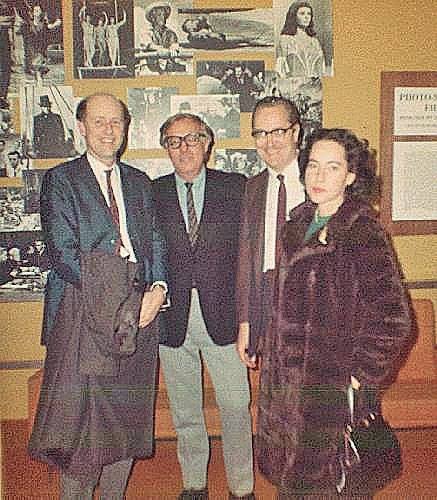American exceptionalism, Madeleine L’Engle, sci-fi music, and another trailer about a movie you’re likely to skip, all in today’s Scroll.
(1) Did an American manhole cover beat Sputnik into space? While Superman was fictional, a super-manhole-cover may actually have flown “faster than a speeding bullet.”
The next month, in [an underground nuclear bomb] test codenamed Pascal B, the team wanted to experiment with reducing the air pressure in the explosives chamber to see how that affected the explosion and radiation spread. A four-inch-thick concrete and metal cap weighing at least half a ton was placed over a 400ft-deep borehole after the bomb was installed below. The lid was then welded shut to seal in the equipment.
Before the experiment, Dr Brownlee had calculated the force that would be exerted on the cap, and knew that it would pop off from the pressure of the detonation. As a result, the team installed a high-speed camera to see exactly what happened to the plug.
The camera was set up to record one frame every millisecond. When the nuke blew, the lid was caught in the first frame and then disappeared from view. Judging from the yield and the pressure, Dr Brownlee estimated that it left the ground at more than 60 kilometres per second, or more than five times the escape velocity of our planet. It may not have made it that far, though – in fact the boffin, who retired in 1992, believes it never made it into space, but the legend of Pascal B lives on.
“I have no idea what happened to the cap, but I always assumed that it was probably vaporized before it went into space. It is conceivable that it made it,” he told us.
(2) And after reading that story, I’m certain everyone can see why the Mutual UFO Network’s “Track UFOs” tool is indispensable. 😉
(3) SF Signal’s always-interesting Mind Meld feature asks “What Books Surprised You the Most and Exceeded Your Expectations?” of Renay from Lady Business, Marc Turner, Ilana C. Myer, Kenny Soward, Marion Deeds, Eric Christensen, and Delilah S. Dawson.
One of the books singled out as a pleasant surprise is a Hugo nominee. Ahh – but which one?
(4) Today’s birthday boy – Ray Harryhausen!
(5) Madeleine L’Engle deserves the accolades paid by the writer in the body of this post for Mental Floss. Not so much the editor’s headline “How ‘A Wrinkle in Time’ Changed Sci-Fi Forever” – because it didn’t.
The book, published at the beginning of the second wave of feminism, also carried a groundbreaking message: Girls could do anything boys could do, and better. A year later, The Feminine Mystique, written by L’Engle’s former classmate Betty Friedan, would emerge as a platform for the frustrated American housewife, and Congress would pass the Equal Pay Act, making it illegal to pay a woman less than what a man would earn for the same job. To some extent, Mrs. Murry in A Wrinkle in Time is already living the future: She’s a brilliant scientist who works alongside her husband and in his absence, too; later in the series, she wins a Nobel Prize. (Math whiz Meg would grow up to follow similar pursuits.) And Meg, a girl, is able to succeed where the men and boys—Calvin, Charles Wallace, and her father—cannot.
With that character so like herself, L’Engle struck back against the 1950s ideal of the woman whose duty was to home and family (the same expectations that conflicted the author in her thirties). Instead of staying at home, Meg goes out into the universe, exploring uncharted territories and unheard-of planets.
At the time, science fiction for and by women was a rarity. There was no one like Meg Murry before Meg Murry, though she left a legacy to be picked up by contemporary young adult heroines like The Hunger Games’ Katniss Everdeen and the Harry Potter series’ Hermione Granger. Beyond creating this new type of heroine, A Wrinkle in Time, along with Norton Juster’s 1961 book The Phantom Tollbooth, changed science fiction itself, opening “the American juvenile tradition to the literature of ‘What if?’ as a rewarding and honorable alternative to realism in storytelling,” writes Marcus. This shift, in turn, opened doors for writers like Lloyd Alexander and Ursula K. Le Guin. In these fantasy worlds, as in the real world, things can’t always be tied up neatly. Evil can never be truly conquered; indeed, a key to fighting it is knowing that. It’s a sophisticated lesson children thrill to, and one in which adults continue to find meaning.
I remember enjoying L’Engle’s book – which I heard read aloud a chapter a day by a teacher in elementary school. A Wrinkle in Time, published in 1963, was received as a children’s book. Women who did groundbreaking work in the adult science fiction genre like Judith Merril and Andre Norton had already been writing for years by then. And when Ursula Le Guin and Anne McCaffrey first appeared in the late 1960s, their emergence was facilitated by the New Wave.
![]()
(8) There will be a live showing of 2001: A Space Odyssey at the Hollywood Bowl in LA on August 18 with the musical soundtrack performed by the Los Angeles Philharmonic and Los Angeles Master Chorale.
Recognized as one of the greatest works of science fiction cinema, Stanley Kubrick’s 2001 is acclaimed for its technological realism, creative audacity and inspired use of music. Behold the film’s visual grandeur on the Bowl’s big screen while the soundtrack is performed live, including Strauss’ Also sprach Zarathustra, music by György Ligeti, and the “Blue Danube” Waltz.
The Hollywood Bowl will give E.T. the Extra-Terrestrial the same treatment on Saturday, September 5, with the Los Angeles Philharmonic performing John Williams’ entire Academy Award-winning score.
(9) H.P. in his post “On the Hugo Awards controversy” on Every Day Should Be Tuesday draws this conclusion —
The big difference comes down to matters of style and subject preference. The Puppy nominees show a pretty heavy thumbprint of Larry Correia, Brad Torgersen, and Vox Day’s tastes. They run heavy to kaiju, superficial noir elements, and religious themes. They don’t align well with my own tastes, but then neither do the tastes of the recent Hugo electorate. If the Hugos are to be the sort of elite fan award that they purport to be, and once were, then they shouldn’t display such narrow tastes, whether of Puppies or anyone else. To that end, my hope is that all of this will draw more people into the process and lead to a more diverse electorate; my fear is of that electorate being dominated by factions. We will see (always end with a super strong closing line).
Yes! The solution is — fire the voters!
(10) “Do you believe in miracles?” This time it’s not Al Michaels asking the question but Jason Sanford.
All of which brings up an interesting coincidence — the 2016 DeepSouthCon has been cancelled. According to an announcement on their website, the people running the con “decided that it was no longer feasible to host the convention.”
I have no proof the selection of Wright as guest of honor and the cancelling of the convention six months later are in any way related. These facts may simply be two isolated events swirling in the chaos we delightfully call existence.
But this is still an interesting coincidence. Or miracle, depending on your worldview.
Some say that Outlanta picking the same May 13-15, 2016 weekend weighed heavily in the decision. If so, I agree it’s logical that a con with Wright as GoH would have trouble competing for Outlanta’s fan base….
(11) Samuel Delany, interviewed in The New Yorker, was even asked about the topic du jour —
In the contemporary science-fiction scene, Delany’s race and sexuality do not set him apart as starkly as they once did. I suggested to him that it was particularly disappointing to see the kind of division represented by the Sad Puppies movement within a culture where marginalized people have often found acceptance. Delany countered that the current Hugo debacle has nothing to do with science fiction at all. “It’s socio-economic,” he said. In 1967, as the only black writer among the Hugo nominees, he didn’t represent the same kind of threat. But Delany believes that, as women and people of color start to have “economic heft,” there is a fear that what is “normal” will cease to enjoy the same position of power. “There are a lot of black women writers, and some of them are gay, and they are writing about their own historical moment, and the result is that white male writers find themselves wondering if this is a reverse kind of racism. But when it gets to fifty per cent,” he said, then “we can talk about that.” It has nothing to do with science fiction, he reiterated. “It has to do with the rest of society where science fiction exists.”
The interview is behind a paywall, nevertheless the Google cache file revealed all.
(12) American Ultra comes to theaters August 21. With luck, you’ll have something better to do that evening.
[Thanks to David K.M. Klaus and John King Tarpinian for some of these stories. Title credit goes to Brian Z.]


